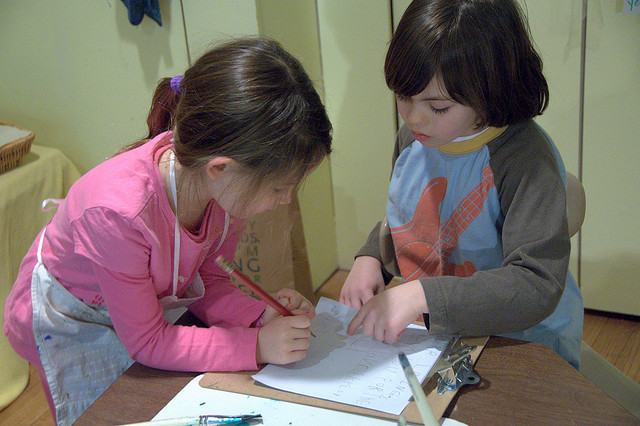
I am amazed at how many children have a deep love for writing. They are the ones who take their writing journals to recess, lunch, and even home to record their experiences – they want to make sure they ‘capture’ that special moment that will inspire them to write even more. However, we all know that NOT all children have an innate passion for the written word.
After years of trying strategy after strategy, I believe I have compiled a list that has worked for most of my students. And trust me, whether you are a parent or educator, threats, taking privileges away, or getting upset WILL NOT make them write or want to write more.
1- Make the experience enjoyable. It sounds like a ‘no brainer’ but it is easy to get frustrated and go from “Let’s find something to write about today” to “You are not leaving your room until you have at least a page of writing in your notebook.” With the latest one, you will see that children WILL get the page filled, but with giant words. You requested it, and they delivered (they got the page filled!).
2- Start Small. Writing does not have to take hours and does not need to happen sitting at a desk. Start small. Maybe you want to have your child start with an illustration/picture and then move on to having him/her add information about that picture. Sometimes it is not about baby steps, but rather ‘ant steps.’
3- Let them write in a ‘special notebook.’ Before starting to add words on the page, spend time with your child decorating his/her notebook. Look for photos of family, pets, special events, vacation/trips and/or pictures of things that he/she loves (from ponies to Minecraft). This will really decrease the chances of his/her journal getting lost and, most importantly, they will have a ‘special place’ to record those thoughts.
4- Give them freedom of choice. As long as they are writing, let them write. A word of caution and this applies especially to boys – they love to write about topics that for many adults are just too much to handle. Examples? Bodily/physiological functions, gross things, and violent events (on this last one, you can definitely set boundaries), but keep in mind that boys will be boys.
5- Writing is everywhere. Encourage your child to take his journal everywhere he/she goes and devote a few minutes to writing. You will see that slowly, he/she will see how writing is not as difficult and they first thought.
6- Use mentor texts. Have a special picture book you love? Then share it with your child and try to have your child imitate a craft the author is using. There are plenty of great ideas under the “31 Days of Reading in Spanish.” You will surely find something you both love.
7- Stop being the editor. No one likes to write when we know we will get back a page full of red marks. Editing skills are necessary, but too early in the process can stop your child for wanting to write because of the fear of just doing it ‘wrong.’ Let them become fluent writers first, editing will come later.
8- Know that frustration is part of the process. Writing in another language can be a bit more frustrating than writing in the language your child feels more comfortable in. He/she needs to think harder to find the right words. Don’t discourage them by saying, “Look for that word in the dictionary.” Do you know how long it would take him/her to finish a paragraph? Have them circle the words they are not sure about, you can later meet and chat about those words. An authentic teachable moment indeed.
Writing can be both exciting and fun, but remember to start small. You will be amazed at how your child can soon become an amazing author. And as always, I am looking to expand my repertoire of strategies. What have you done that has proven to be effective? I would love to hear.
Much love,
Kelly
Photo by WellSpring School



Great post and topic, thank you!! I recently gave my five year old a little notebook without saying one thing about what he might choose to do with it. Lo and behold — that kid started writing!! He copied down words that he saw, he asked how to spell things (in English and Spanish), he started experimenting with how to spell words and put together sentences…..it’s been absolutely amazing and exciting. I have decided that his willingness to try was directly correlated to my relaxing about it. Too bad relaxing is one of the hardest things to do, right?!
Stacy,
So happy you found the article helpful. And happier to read you little one is already developing alove for writing.
Amazing!
Abrazos,
Kelly
Thank you for producing such a awesome publish which is really verywell written.will be mentioning a lot of pals concerning this.
Thank you for making this website so easy to find info. great stuff. Saving this one for later.
Thanks. That is usually what I do. However, I started to doubt. I just hope I don’t make her hate Foreign languages because of my crazy ways.
I’m Always Looking For New Bilingual Books To Share With school Families.
Like empty walls, your blog is awesome dude. Keep up the good work.If blogs were like pancakes, you would be Miss Butterworth! Keep up the good work.My blog pales in comparison to your outstanding blog.If blogs were like hot dogs, you would be the skinny asian guy who can eat more than anybody.
This is an excellent list of recommendations that I would like to translate into Spanish and put up on our website (of course, including a loud and clear mention of the author). Is there any way we can reach an agreement?
Hi there, just became alert to your blog through Google, andfound that it’s really informative. I’m goingto watch out for brussels. I will appreciate if you continue this in future.
What i do not understood is in truth how you’re now not actually much more neatly-appreciated than you may be now. You are so intelligent. You realize thus significantly in terms of this matter, made me in my opinion believe it from so many varied angles. Its like women and men don’t seem to be interested unless it¡¦s something to do with Girl gaga! Your individual stuffs nice. All the time take care of it up!
Nhà cái cá độ sòng bài được nhận xét là tốt nhất, đảm bảo nhất phải đảm bảo được các điều kiện như: khả năng thanh toán, đặt cọc và rút tiền nhanh, nhiều odds, tỉ lệ cược cao và hấp dẫn, giao diện đẹp và thân thiện, có nhiều chương trình khuyến mãi lớn, nhân viên hỗ trợ chu đáo, nhiệt tình… Với kinh nghiệm cá độ lâu năm, chúng tôi đánh giá và xếp hạng nhà cái cá độ casino uy tín nhất trên tất cả các yêu cầu và cung cấp những thông tin mới nhất để mọi người lựa chọn được nhà cái phù hợp cho riêng mình
I do not even know how I ended up here, but I thought this post was good. I don’t know who you are but definitely you’re going to a famous blogger if you are not already Cheers!
Kitchen Design Kitchen Interior Design Malaysia Home Services
I pay a quick visit every day a few sites and information sitesto read articles or reviews, however this blog gives feature based articles.
You’ve got a wonderful blog here! would you like to produce some invite posts on my blog?
If you haven’t tried the Christmas Tree app yet, then you’re missing out on a ton of fun. Any material is usually consumed just by a living thing plus ingested by the organism’sstructure in an effort to produce energy source, keep up lifetime, or possibly increase growth.There is a huge array of wallpapers to decide on fromthis subcategory.
Nice post. I was watching continuously this site and I’m impressed! Extremely useful info specifically the last part I care for such info much. I was looking for this particular info for a long time. Thanks and best of luck.
She works for an antisemite and she is an antisemite.
Hello, This is a really nice looking site. Are you a website designer or did someone make this lovely design for you?
The Crescent City, New Orleans, would love to see Nephew Tommy performing live. We got our people with us as well!!!!! Please think about adding the New Orleans or Baton Rouge area to your itinerary, we would support you!!!!
Hmm i hope you don’t get offended with this question, but how much does a website like yours earn?
Sometimes I contemplate if folks truly take time to publish something original, or are they only just dishing out words to fill a site. This certainly doesn’t fit that mold. Thank you for taking the time to write with awareness. At times I look at a page and question whether they even proofread it.Fantastic work with this article.
It is highly helpful for me. Huge thumbs up for this site post!
Wonderful goods from you, man. I have understand your stuff previous to and you are just extremely great. I really like what you’ve acquired here, really like what you are stating and the way in which you say it. You make it enjoyable and you still care for to keep it smart. I can’t wait to read much more from you. This is really a wonderful web site.